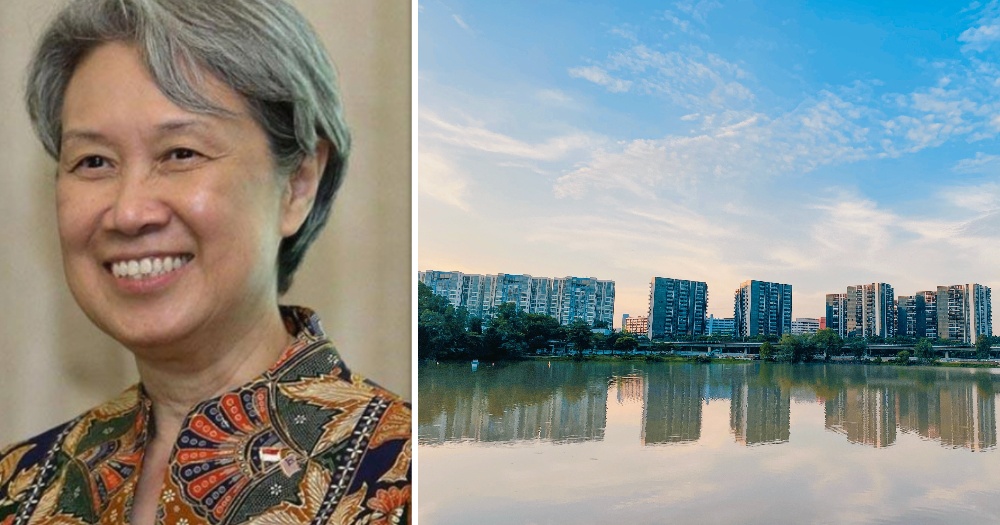Follow us on Telegram for the latest updates: https://t.me/mothershipsg
"Relax, lah!"
That was what Ho Ching, chairman of Temasek Trust, advised in a recent Facebook post to residents in Singapore who had expressed shock and worry over the latest increases in the Additional Buyer’s Stamp Duty (ABSD) rates, announced by the government on Apr. 27.
In her post on Apr. 30, Ho noted that others had also expressed surprise following news by The Straits Times that some buyers had snapped up 75 per cent of units in a recent condo launch, after the announcement.
Ho went on to explain who the new ABSD cooling measures really affect, and clarified why current movements in the property market may actually not be that much of a cause for concern for many Singaporeans.New ABSD increases don't affect majority of Singapore home buyers
Firstly, Ho clarified that the newest ABSD increases do not actually affect the majority of Singaporean home buyers.
Singapore citizens do not have to pay for ABSD when they purchase their first residential property, so many Singaporeans will "still enjoy zero ABSD" for their first property.
The ABSD rate that Singapore permanent residents have to pay on their first residential property – five per cent – also remains unchanged.
Taken together, this means that Singapore citizens or permanent residents buying their first residential property stand to benefit the most from the change, as the increase in ABSD does not apply to them.
The newest ABSD cooling measures instead target owners of "second, third, and higher number of residential properties", as well as "foreign buyers", wrote Ho.
This constitutes about 10 per cent of residential property transactions.
The remaining 90 per cent of buyers of residential property comprises first time home buyers, with the "rare exceptions" being those who are posted overseas for work or other reasons.
Option for ABSD refund for eligible home buyers
For home buyers looking to upgrade or downgrade their flat, or move house for various reasons – such as to be nearer to parents, or be proximal to better schools for their kids – there is also still the option of getting an ABSD refund when purchasing a second residential property, Ho reminded.
This is as long as certain conditions are met: married couples with at least one Singapore citizen spouse who jointly purchase a second residential property, will be able to get the ABSD refund if they sell their first property within six months of purchasing their second.
With no upfront ABSD needed for those looking to purchase an Executive Condo (EC) for their second property, Singaporeans similarly just have to make sure their first property is sold within six months to avoid paying ABSD completely.
Ho noted:
"After all, the ABSD is meant as a property cooling measure, not intended to prevent home mobility.
So we have six months to sell our first property, to claim back our ABSD."
Those who are worried about being able to sell their first property in six months can then consider doing a leaseback for two to three years so they can stay in their first home, while hunting for their next "dream home".
"Another layer of wealth tax"
Ho encouraged those who could afford to buy more than one property, whether for an investment, or as a gift to their children or parents, to think about the ABSD as "another layer of wealth tax".
"The ABSD they pay can be considered [as] a donation to [the] government to support various social programmes or public good services including education and defence."
Given that there are admittedly other ways to invest or build a nest egg for loved ones, these individuals should consider the ABSD increases as "a sharing of their good fortune", or as a "payback of their good fortune".
Foreigners should consider investing in S-REITS
Foreign buyers who are still interested in property assets can then consider investing in S-REITs or S-REIT ETFs instead, as an alternative to "crowding into the residential home market in tiny Singapore", Ho suggested.
For foreign buyers, the ABSD rate saw the most significant increase, doubling from 30 per cent to 60 per cent.
Ho noted that there are now over 30 S-REITs that interested investors can also look into, with relatively decent yield from four per cent for more conservatively managed portfolios, to over 10 per cent for higher risk portfolios.As such, investors no longer have to buy "single chunky assets", which could be hard to dispose of when cash is needed.
This makes sense as for most foreign buyers, it is unlikely that they are looking to purchase a home in Singapore, Ho pointed out.
"We are just too small a place for a massive wave of non-Singaporeans or PRs [to want] to park their money in a relatively non-productive asset like a residential home."
Foreign buyers are thus "most welcome" to invest in other segments of the economy instead, so residential properties can remain as homes for those who buy with the intention of being owner-occupiers.
Ho reassured Singaporeans that the increase in ABSD is likely because the Monetary Authority of Singapore (MAS) had observed "increasing flows" into the residential property market post-pandemic, and decided to implement the "preemptive cooling measures" in light of various macro global trends.
"So relax folks, there is really no need to hyperventilate about the latest ABSD increases."
Related stories:
Top images via Temasek/FB and Unsplash
If you like what you read, follow us on Facebook, Instagram, Twitter and Telegram to get the latest updates.
